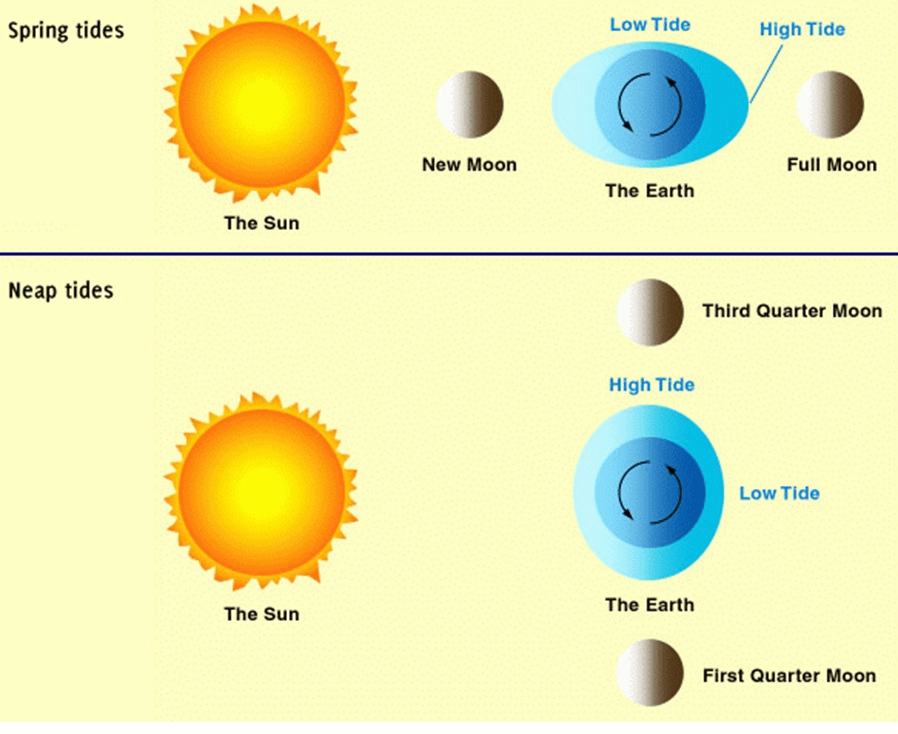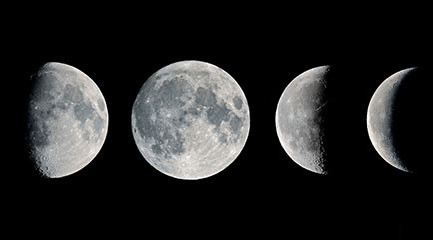Which one of the following is NOT proof that something is a planet?
A. It is round because of its own gravity.
B. It has an atmosphere.
C. It has a clear orbit.
D. It orbits a star.
B. It has an atmosphere.
Atmosphere has nothing to do with something being a planet, a dwarf planet, a star, a moon, an asteroid or anything else! Do yourself a solid and forget about it! :)
What type of galaxy is the Milky Way?
A. Circular
B. Webbed
C. Spiral
C. Spiral
At the sun's core, hydrogen atoms combine to form helium, a process called ________.
Fusion
What are two ways energy moves through the sun, __________ and ___________.
Radiation and Convection
Which number shows the Northern Hemisphere (i.e. Chicago or us) starting winter?
Spot 4: The northern hemisphere (top of Earth) is tilted away from the Sun, getting less daylight, and thus less heat.
Why do we have cold temperatures in the winter even on sunny days?
A. The southern hemisphere gets more light.
B. The northern hemisphere gets more direct sunlight.
C. The sun is farther from the Earth.
D. The southern hemisphere gets more direct sunlight.
D. The southern hemisphere gets more direct sunlight.
The northern still gets light, it's just not direct.
Of the three following forces, which causes planetary nebula to form into a solar system?
Nebular
Gravity
Planetary
Gravity
Current science suggests the universe is...
a. expanding at a constant rate
b. going to contract
c. expanding faster than before
d. none of the above
C. Expanding faster than before
Corona, Photosphere, Core, Mantle, Radiation zone, Crust, Chromosphere
Corona, Photosphere, Core, Radiation zone, Crust, Chromosphere
All stars begin with...
A. a bang
B. helium and carbon
C. a nebula
d. several planets
Everything that is in the universe formed out of nebulas. They are just big clouds of dust and gas, and when gravity pulls them together they make stars or planets, or other space objects.
On this diagram, which number shows the Northern Hemisphere having summer?
Spot 2: The northern hemisphere (top of Earth) is tilted towards the Sun, getting more daylight, and thus more heat.
Is this star redshift or blueshift? What does that mean?
Redshift. The star is getting farther away.
The order of planets from the sun (closest to farthest) is:
Sun- Mercury, Venus, Earth, Mars, Saturn, Jupiter, Neptune, Uranus
Sun- Mercury, Venus, Earth, Mars, Jupiter, Saturn, Uranus, Neptune
What do scientists study for evidence that the universe is billions of years old? (Think about our Cosmos video with all the different cameras)
Radiation
Our sun, after fusing most of the hydrogen at its core, will become a _____________, then after using all the hydrogen and helium becomes a _______________.
Red Giant, White Dwarf.
(In that order specifically)
A star 1.4 times as big as the Sun uses up its hydrogen. What happens?
It supernovas and forms a neutron star. (Sometimes a black hole if 3x bigger.)
At what position is spring starting for the Northern Hemisphere?
Spot 1
Draw in the updated arrows for the new model:
Arrows should be half as long on both Moon and Earth
Order these planets from largest to smallest:
Earth, Saturn, Mars, Uranus
Largest: Saturn
Uranus
Earth
Smallest: Mars
Why do scientists think that dark matter exists?
A. it blocks most light in the universe due to radiation.
B. It would explain what's in the middle of a black hole.
C. It's another name for anti-matter.
D. The gravity between galaxies is too great for their mass.
D. The gravity between galaxies is too great for their mass.
(Remember: mass (more matter) = more gravity. Dark matter has mass too, so it add gravity as well.
Astronomers say that a star is a balance of radiation and gravity. This is because...
Stars lose mass and energy through radiation (like what goes to Earth), but gravity tries to hold the star-stuff together.
A star keeps existing as long as those two are equal.
Two stars have equal brightness. But one looks dimmer, why?
The second star is farther away.
Remember, temperature, color, and size don't affect brightness. But if a light is farther away, it's harder to see.
(Note: Changing distance is our red-shift, blue-shift stuff. Study it too.)
Use a diagram to show the positions of the Earth, Moon, and Sun during the following tides:
a. Spring Tide
b. Neap Tide

Name the main 3 ways the inner and outer planets differ.
- Outer planets are further from sun / inner planets are closer to Sun
- Inner planets are rocky / outer planets are gas
-Inner planets are much smaller than outer planets / outer planets are much bigger than inner planets.
What are the four types of galaxies? What holds them together?
Elliptical
Spiral
Barred Spiral
Irregular
--Gravity holds everything in the universe together.
Without supernovas, everything on our planet, including itself, would not exist. Why?
Supernovas give off matter and energy that turn into nebulas, that turn into planets.
Identify the 4 Lunar Phases below:

1. Waxing Gibbous
2. Full Moon
3. Third Quarter
4. Waning Crescent
Why does the Earth have seasons? (Remember to have at least the 3 main points we discussed.)
1. The Earth goes around the Sun.
2. The Earth is tilted/at an angle.
3. The angle changes the amount of daylight, which changes the temperature.
DAILY DOUBLE!!!! Worth 2x the POINTS!!
According to an H-R Diagram,
A. the hottest stars are ____________
B. The brightest stars are ______________
C. The largest stars are _____________
D. The longest living stars are _____________
E. The stars with the most mass are ______________
A. Blue stars
B. The ones on the top
C. The ones at the top right
D. The white dwarfs (also red dwarfs)
E. The top left- they have the most fuel to burn.